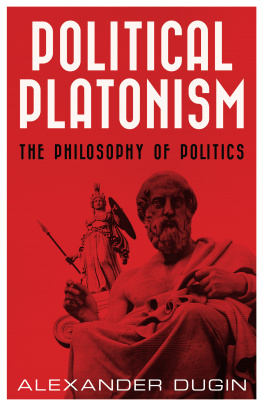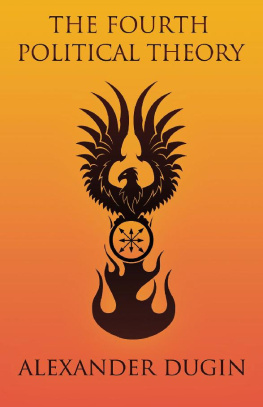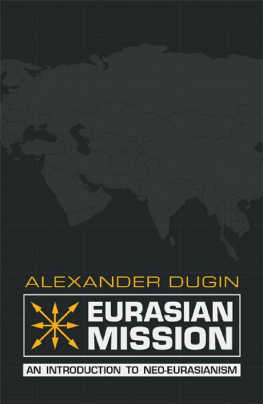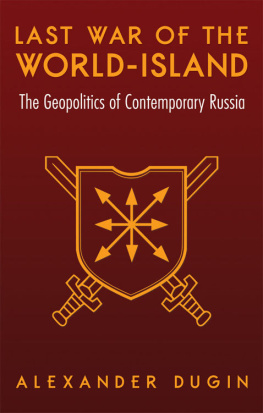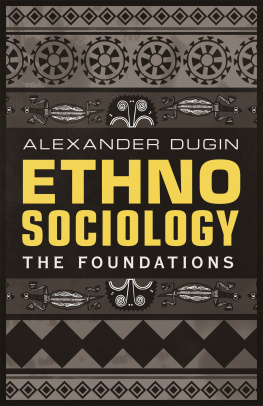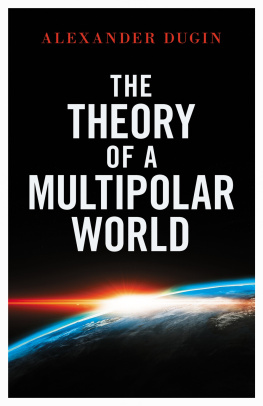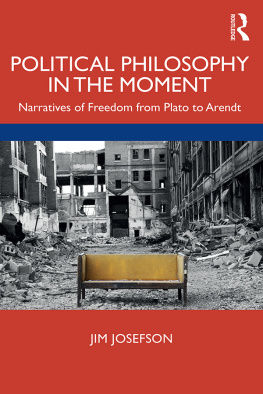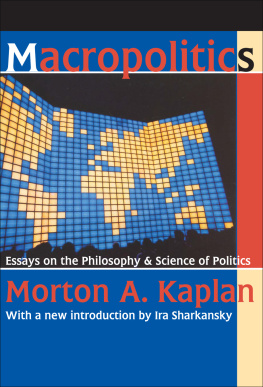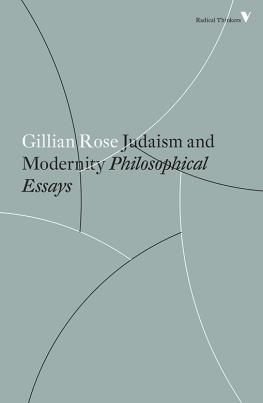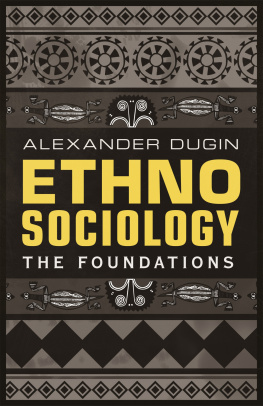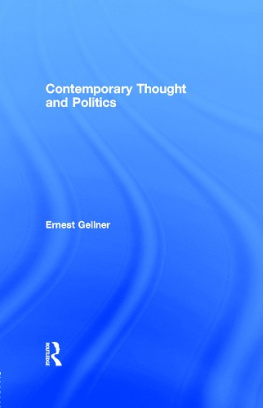
Arktos
London 2019

Copyright 2019 by Arktos Media Ltd.
All rights reserved. No part of this book may be reproduced or utilised in any form or by any means (whether electronic or mechanical), including photocopying, recording or by any information storage and retrieval system, without permission in writing from the publisher.
Arktos.com | Facebook | Twitter | Instagram | Gab.ai | Minds.com | YouTube
ISBN
978-1-912079-90-2 (Softcover)
978-1-910524-39-8 (Hardback)
978-1-912079-89-6 (Ebook)
Translation and Editing
Michael Millerman
Ciarn Conaill
Cover and Layout
Tor Westman
The Philosophy of Politics
This is a transcript of the first thirty-five minutes of the first lecture of a course on The Philosophy of Politics that Dugin gave at Moscow State University in 2014. The entire lecture series is available in Russian on Dugins Youtube Channel.
First, let us consider the nature of this discipline and what it studies. If we look at the history of philosophy and of political systems, we will see the following regularity. Philosophy and politics, from the very beginning, from the very birth of these two disciplines, developed not only in parallel, but inseparably from one another. Among the Seven Sages, considered the founders of the Greek Pre-Socratic philosophical tradition, there are many, including Solon, who are famous for writing political laws, constitutions, and criminal codes, and who were essentially political actors representing their cities, and their political units. So at the very beginning of the history of philosophy, we see an inseparable connection between philosophy and politics. Viewing politics as a separate phenomenon, disconnected from philosophy, is completely foreign to the origins of the philosophical tradition.
The philosophy of politics is deeper than this. It is a discipline that considers the philosophers who engage in politics, the philosophers who write about politics, and the political actors who base their laws, the establishment of their political system, on philosophical principles. The subject matter of philosophy and of politics is that originary sphere that unites philosophy and politics in a certain shared orientation. In other words, I want to say that we are not artificially uniting two spheres, one of politics, and one of philosophy, but are removing an artificial distinction. We do not study politics with the help of philosophy, and we are not speaking about the political philosophy of one or another school, period, culture, or civilization. When we speak of the philosophy of politics, we are talking about the essence of politics, of that which makes politics politicson the one hand. On the other, we are talking about the political essence of philosophy, which makes philosophy philosophy.
There is a difference between the two, however. Philosophy predominates here, because politics without philosophy is not possible at all. Politics is a form of applied philosophy; it is the application of philosophy to a certain sphere of human life. Philosophy without politics, however, is possible, theoretically. That is, there is a philosophy that does not occupy itself with politics, but there is no politics that is not based on philosophy. So, there is an inequality here; philosophy predominates. Nevertheless, philosophy studies politics; not only the philosophical foundations thereof, but also the political aspects of philosophy itself; because politics is not a partial and accidental application of philosophy, but the most general, most fundamental, yet applied, element of philosophy. As soon as philosophy appears, it necessarily, first of all, when it exists, turns to politics; and all politics emerges from philosophy. Between them there exists an unequal, but very deep, organic connection. There, where this original unification of the philosophical and the political occurs, the birth of all possible political systems and at the same time the crystallization of philosophical knowledge happens.
Although there is a philosophy that, free from politics, occupies itself with non-political questions, even such a free, non-political philosophy is connected in one way or another with politics, inasmuch as philosophy and politics have a common root. For this reason, if philosophy considers aesthetic questions, historical questions, and cultural questions, and says nothing about politics, this does not mean that it is a completely separate phenomenon. Any philosophy at all, even the most abstract, has a political dimension, in some cases explicitly. In the case of Solon, as in the case of the ancient Greek Pre-Socratics and Sages, and as in the case of Plato and Aristotle, this is an explicit dimension of philosophy, but there is also an implicit political dimension of philosophy. When philosophy says nothing about politics, it still has the presence of a philosophical paradigm of one kind or another, which carries in itself the possibility of a political dimension. In one case it is explicit, open, and manifest; in the other, it is implicit and contained.
Because of this, there is a very deep connection between philosophy and politics, a connection at the level of their origin. The study of philosophy without politics already in itself impoverishes and weakens the concept of philosophy. On the other hand, the study of politics without philosophy is not at all valid. In that case, weve already gone the way of programming and established rule by [Microsoft] Word; that is, open file, close file. We are good programmers.We know two functions, save and save as. We can be excellent users of Word, we can write very good texts on Word, but we are not programmers. People who do not have the philosophy of politics, who do not have philosophy, they are as much politicians as computer programmers are. In fact, a person who does not know philosophy cannot engage in politics; hes not a politician. He is a hired government worker who is simply in front of a wall. Someone has told him: go there, do that. What to do, where to go.He might be an excellent user, but in reality politicians who lack a philosophical dimension are merely on a construction-site, some foreign construction-site.In reality, without philosophy, there is no politics, period. Politics is one of the dimensions contained within philosophy.
Politics without philosophy does not exist, but philosophy without politics does exist, because it is primary in relation to politics; but all philosophy has a political dimensioneither, as I said, explicitly, or implicitly, in which case we are silent about it. This silence of philosophy concerning its political dimension or expression is not a total silence; it is more reticence than silence. That is, philosophy that does not occupy itself with politics knows about politics, and has it within itself, but openly does not speak about it. This is a peculiar silence. There is the silence of the wise man, and there is the silence of the fool. The fool stays silent in order not to say the wrong thing, because he senses that if he starts to talk, nothing good will come of it. The wise man stays silent for a completely different reason. The silence of philosophy concerning politics is the silence of the wise man, but, if we inquire of the wise man properly, he will tell us what he knows about politics and what he tells will be entirely sensible. He is, however, silent.
So, any philosophical system carries in itself a political dimension, but not every philosophical system develops this model explicitly. Thats the most important thing in order to understand the sphere of the subject matter that we will be studying in the course of the philosophy of politics. In other words, we are studying the philosophical root, the base, the programming base, and the matrix base, of all politics, which is entirely reducible to philosophythere is nothing in politics, not a single element, which does not lead to, is not explained by, and does not emerge from philosophy. Simply, politics is a part of philosophy, so well be studying that. Well also be studying the political dimension of philosophy; on the other hand, the philosophy which carries politics within it is of course richer than politics, but nevertheless in any philosophical system we can discover, even there where nothing is said about it, a possible application to the political sphere, i.e. the possibility of deriving from philosophy political content. [] Politics is if you will the most important case of the application of philosophy. []
Next page
